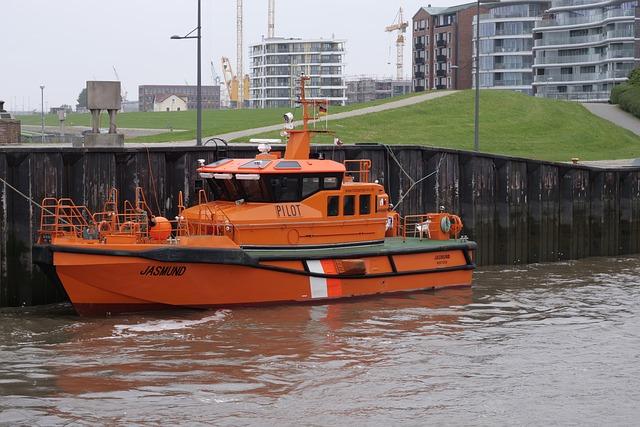Bulker-LNG Service Collision Highlights Gaps in Present Pilotage Rules
The current collision between a bulker and an LNG service in Gibraltar has despatched shockwaves by the maritime neighborhood, illuminating essential vulnerabilities in present pilotage laws. Because the maritime trade more and more navigates by complicated transport lanes, this incident has raised vital questions on the effectiveness of the present pilotage framework. Consultants argue that the reliance on conventional protocols has failed to adapt to the rising measurement and complexity of contemporary vessels. The want for enhanced coaching and technological integration in piloting practices can’t be overstated, as transport routes proceed to see a surge in vessel visitors.
In response to this incident, stakeholders are calling for an intensive reevaluation of pilotage necessities, emphasizing the significance of prioritizing maritime security. Potential areas for reform embrace:
Up to date Coaching Packages: Making certain pilots are well-versed in new navigational applied sciences.Enhanced Communication Protocols: Establishing clearer channels between vessels and visitors administration methods.Common Danger Assessments: Conducting frequent evaluations of ship routing and visitors density.
Addressing these gaps is important not just for sustaining security requirements but additionally for safeguarding the financial pursuits tied to Gibraltar’s strategic transport routes. Because the overview course of unfolds, the main focus will doubtless shift to collaborative efforts between maritime authorities, transport firms, and pilotage organizations to forge a forward-thinking strategy on this essential sector.

Gibraltar’s Maritime Security Considerations Immediate Pressing Evaluation of Pilot Coaching Requirements
The current collision between a bulk service and an LNG vessel close to Gibraltar has raised vital alarms relating to maritime security in one of many world’s busiest transport lanes. This incident has sparked a essential evaluation of the present pilot coaching requirements, as authorities intention to stop related occurrences sooner or later. Consultants have highlighted the complexities of navigating the strait,which is infamous for its difficult climate situations,heavy visitors,and complicated maritime laws. This overview is available in the wake of rising worldwide scrutiny relating to the preparedness of pilots who’re tasked with guiding giant vessels by these perilous waters.
In response to the incident, a number of key areas are being scrutinized for potential enhancements in pilot coaching, together with:
Enhanced Simulation Coaching: Using superior simulation know-how to duplicate real-life eventualities that pilots could face within the strait.Up to date Security Protocols: Reassessing and updating emergency response procedures to accommodate the rising measurement and complexity of contemporary vessels.Common Efficiency evaluations: Implementing stringent periodic assessments to make sure that pilots preserve excessive competence ranges all through their careers.
Moreover, native maritime authorities are considering collaborative methods with neighboring ports to bolster total navigational security. These might embrace joint coaching workout routines and cross-border pilot trade applications, geared toward fostering a tradition of shared studying and greatest practices inside the maritime neighborhood.

Influence of the Collision on Delivery Commerce Routes and Native Financial system
The current collision between a bulker and an LNG service within the strategic waters of Gibraltar has raised pressing questions relating to the reliability and security of established transport commerce routes. Native authorities have famous that such incidents not solely pose rapid dangers to maritime security however additionally threaten the financial material of the area. In the quick time period, transport operations might face delays, impacting the well timed supply of products and doubtlessly inflicting ripple results throughout the world provide chain.Key commerce routes reliant on the Gibraltar Strait might see a decline in visitors, which can compel companies to rethink their logistical methods, finally affecting worldwide commerce dynamics.
In parallel with issues about maritime security, the native financial system could expertise vital shifts as a results of the collision. Companies tied to transport and commerce, comparable to logistics companies, docking services, and native providers, might face downturns resulting from decreased transport volumes. Components contributing to this financial affect embrace:
Elevated insurance coverage premiums for vessels navigating high-risk areas.Potential downtime for native port operations whereas security critiques are carried out.Lengthy-term reputational results on Gibraltar as a trusted maritime hub.
The want for an intensive overview of pilotage necessities has additionally surfaced as a possible pathway to revive confidence in maritime operations. Strengthening pilotage laws couldn’t solely improve security protocols but additionally assist safeguard the livelihood of native communities reliant on the transport trade.

Suggestions for Enhanced Pilotage Protocols to Forestall Future Incidents
The current collision between a bulker and an LNG service has highlighted the pressing want for a complete overview of pilotage protocols inside Gibraltar’s navigational waters. To mitigate the danger of comparable incidents occurring within the future,maritime authorities ought to contemplate the next enhancements to their pilotage methods:
Enhanced Coaching Packages: Implementing rigorous coaching modules that focus on collision avoidance,disaster administration,and environmental consciousness for all pilots.Actual-time Knowledge Integration: Using superior navigational know-how to present pilots with instantaneous entry to maritime visitors information,climate patterns,and potential hazards.Common Security Drills: Establishing a schedule for frequent security drills that simulate emergency eventualities, making certain that pilots and crew members are well-prepared to reply successfully.Stakeholder Collaboration: Selling communication and collaboration between varied stakeholders—together with transport firms, port authorities, and native maritime companies—to share insights and greatest practices.
Furthermore, a overview of present pilotage methods ought to incorporate suggestions from current incidents. the institution of an investigation board consisting of maritime consultants might help in figuring out weaknesses and recommending actionable enhancements.A proposed set of metrics for evaluating pilot efficiency and incident reporting might embrace:
MetricDescriptionIncident FrequencyNumber of collisions or near-misses reported yearly.Response TimeAverage time taken by pilots to answer navigational alerts.Coaching Completion RatePercentage of pilots finishing superior coaching applications.

Stakeholder Reactions: Views from the Delivery Trade and Regulatory our bodies
The current collision involving a bulk service and an LNG service in Gibraltar has induced ripples by the maritime sector, prompting numerous responses from stakeholders within the transport trade and regulatory authorities. Shipowners are notably involved in regards to the implications of such incidents on navigational security and the rising prices of insurance coverage premiums, that are doubtless to rise as underwriters reassess danger components related to transiting by busy maritime routes. Many transport firms are advocating for enhanced pilotage coaching and a overview of the present navigational protocols to make sure higher incident prevention and response mechanisms.
Regulatory our bodies have echoed these issues, calling for a complete overview of pilotage requirements to keep up excessive security benchmarks. This overview could embody a wide range of key issues, together with:
Evaluation of present pilot coaching programsAnalysis of visitors administration in congested waterwaysImplementation of superior navigational know-how to assist pilots
To facilitate higher stakeholder engagement, the Gibraltar Port Authority plans to arrange a collection of roundtable discussions, bringing collectively trade leaders and maritime security consultants. The objective is to formulate actionable methods that not solely handle the rapid fallout from the incident but additionally pave the way in which for extra strong security measures going ahead. These dialogues will assist forge a collaborative relationship between the transport neighborhood and regulators, important for enhancing maritime security in the area.

Way forward for Gibraltar’s Port Operations: Balancing Security with Financial Development
The current collision between a bulk service and an LNG tanker in Gibraltar’s waters has reignited discussions about the way forward for the territory’s port operations. In gentle of this incident, there’s an pressing have to reassess the present pilotage framework to make sure that security measures aren’t compromised whereas facilitating financial progress in one of many area’s busiest maritime hubs.Stakeholders from the port authority, ship operators, and the native authorities are considering the implementation of enhanced pilotage necessities, incorporating superior know-how and coaching to mitigate dangers related to navigating busy transport lanes.
As Gibraltar seeks to steadiness security with financial ambitions, the next methods are being thought-about to fortify its maritime operations:
Funding in coaching: Focus on steady training and simulation coaching applications for pilots to deal with bigger vessels.Technological upgrades: Adoption of state-of-the-art navigational aids and real-time monitoring methods to boost situational consciousness.Regulatory frameworks: Re-evaluation and potential tightening of laws surrounding pilotage to adapt to altering transport dynamics.Stakeholder engagement: Common consultations with maritime operators to grasp operational challenges and collaborative options.StrategyPotential benefitsInvestment in trainingImproved pilot expertise and response in emergencies.Technological upgradesEnhanced navigational accuracy and accident prevention.Regulatory frameworksIncreased security requirements and confidence amongst stakeholders.Stakeholder engagementMore tailor-made options to particular operational challenges.
Key Takeaways
the current collision between a bulk service and an LNG tanker in the waters off Gibraltar has sparked a essential examination of the area’s pilotage necessities. As authorities search to boost navigational security and forestall related incidents within the future, this occasion underscores the necessity for strong maritime protocols and ongoing assessments of pilot coaching and operational procedures.Stakeholders in the maritime trade can be intently monitoring the developments in Gibraltar, because the implications of this incident lengthen past native waters, doubtlessly influencing worldwide maritime practices and laws. The decision for a complete overview serves as a reminder of the complicated challenges confronted in an ever-evolving transport panorama, emphasizing the significance of prioritizing security in one of many world’s busiest maritime corridors.
Source link : https://europ.info/2025/03/23/gibraltar-2/bulker-lng-carrier-collision-prompts-gibraltar-to-review-pilotage-needs-tradewinds/
Writer : Ethan Riley
Publish date : 2025-03-23 01:52:00
Copyright for syndicated content material belongs to the linked Source.


